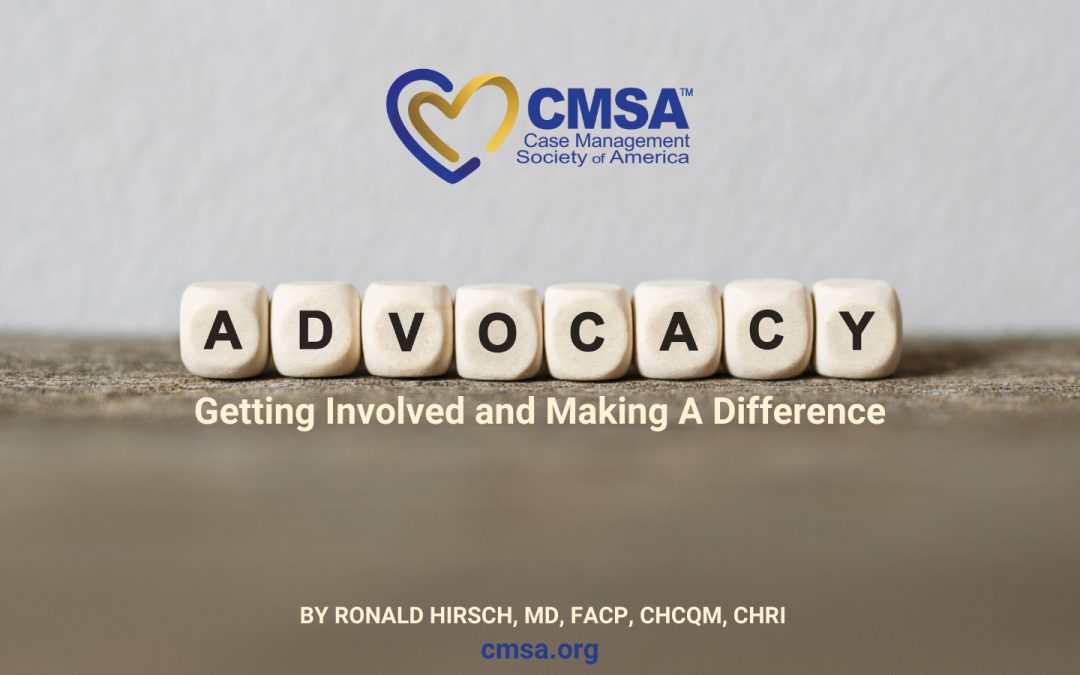Vice President, Regulations and Education Group
R1 RCM Inc.
Physician Advisory Solutions
Every single day each one of us makes a difference in our work. Whether it is arranging home durable medical equipment, setting up a patient appointment with a physician, helping a patient with a POLST, or arranging meal delivery, your work helps that patient. You do it day in and day out. And sometimes you probably look at your work and think of yourself as a hamster on a wheel, doing the same tasks over and over. You know you make a difference for your patients, even if at times the patients and your employer don’t adequately acknowledge their appreciation. But you know you want to do more. If you helped one patient navigate the complexity of their insurance coverage, why not translate that to helping many more? But you have no idea how to get started.
Being a member of CMSA is a great first step. Think about an article you read that taught you something new or demonstrated a new way of approaching an old task. The person who wrote that article is like you; they had a great concept and wanted to share it with others, so they wrote about it. You can do that too. CMSA has several publications that accept submissions and an article for the CMSA blog, like mine, is a great place to start.
Perhaps you piloted a new program and had great success, or it was an absolute disaster. Why not share your experience at a conference so others can learn from you? Your local CMSA chapter has meetings and usually welcome members offering to provide education. And it would be very cool to be on stage at the national CMSA conference and share your concept and results. CMSA also has a public policy committee and does advocacy work with lawmakers. I participated in an advocacy day in Washington, DC for another organization and it was enlightening seeing how government works. We met with a few elected officials, but it was the meetings with their staff people, many of whom are subject matter experts, that really allowed us to discuss the issues and provide valuable input.
You can also make a difference on a smaller scale. While insurance companies often develop policies and procedures behind closed doors, the federal government publishes every newly proposed regulation and solicits public comment. And despite what many think, CMS staff do read every comment and often use those comments to make changes to the rule. While they do not allow the submission of protected health information, examples demonstrating the effects that regulatory changes have on patients are very impactful. As one who is very liberal with commenting, I can attest that all comments are taken into consideration and many lead to substantive modifications. Subscribing to bulletins from Medicare and your Medicare Administrative Contractor will alert you to these proposed rules.
You can also provide advocacy for your patients by encouraging them to provide feedback about how things work or don’t work for them. If their insurer’s contracted provider did not live up to their obligations, the plan needs to know about it. They may call you to resolve the issue but unless the plan hears from patients whose care was adversely affected, they have no way to hold the provider accountable. For Medicare patients, it is as easy as calling 1-800-MEDICARE. Likewise, especially in these trying times, there is nothing better than passing on a compliment about an exceptional experience. Many of us are very good at criticizing but have much less time and energy for gratitude.
While our patients are used to receiving satisfaction surveys and are often not shy about saying what they really think, that feedback is often much more impactful when provided to someone with the power to make change. And who better than their elected official to hear about their issue and to effect change? They have dedicated staff to deal with constituents. Last spring, my wife, a master gardener, noted some adverse effects of lawn chemicals on her garden. She contacted our local representative, provided information and constructive comments, and this week she is meeting with the federal officials at the Environmental Protection Agency. One person can affect change but making the first move is often the hardest.
Access to rehabilitation services, prescription drug costs, resources to address the myriad of social determinants of health, provider burnout, health equity, and much more can all be addressed, if only we all stepped up and let our voices be heard. Start small by talking to your patients, get involved by writing an article, or jump all in and call your congressperson and set up an appointment. After all, case management and advocacy are synonymous.
Learn more about Advocacy in the CMSA Educational Resource Library with “Healthcare & Public Policy: What is Your Role?”.
Click for the full course description and objectives: https://www.pathlms.com/cmsa/courses/36204


Thank you Dr. Hirsch for illustrating the many ways in which case managers can put their advocacy into action by getting involved in CMSA and public policy. Case managers have so much to share as experts in care coordination and patient advocacy. I do believe case management is synonymous with advocacy as you state!
Dr. Hirsch, I really enjoyed reading your Blog! Advocacy is such an important part of the work we do as case managers. Like you, I connected with Legislators thru CMSA on our Public Policy Initiatives.